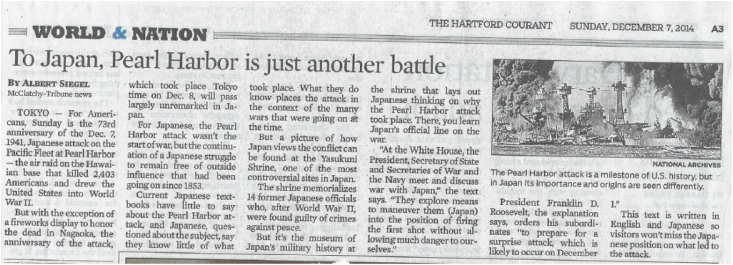Our historical memory of Pearl Harbor is something like this: “The sneaky Japs attacked us without any shred of provocation at all just because we were there; Imperial Japan was so irrationally hyper-aggressive that they would attack anyone, given half a chance”.
From my reading (especially a book or two on this subject by historian John Toland), the Imperial Japanese government in 1941, though definitely aggressive, was not irrational.
There were long debates about this in Tokyo throughout 1941. The hawks said
that the embargo meant Japan, already at war in China, had no choice but to secure resource-rich Southeast Asia — Malaysia, Indonesia, the Philippines (British, Dutch, and American possessions, respectively, at the time) — to retain access to raw materials and keep things rolling. The Europeans could not be expected to fight, given the situation in Europe at the time.During the debates in Tokyo, the doves pointed out that war against any European possessions in Southeast Asia would very likely mean war with the USA, and certainly so in the wider-envisioned campaign which included conquest of the Philippines. So the choice was: Prepare for war with the USA, or begin to rein in the “Greater East Asia Co-Prosperity Sphere” project (Japan’s decades-in-the-making plan to unite East Asia under Japanese leadership; i.e. Japanese imperialism and its network of puppet states, satellites, and allies-to-varying-degrees).
The hawk lobby in Tokyo won the argument, of course, and so Pearl Harbor went ahead. Even the hawks conceded that a long war with the USA would be impossible to win, given the USA’s size and potential in war, so they planned a sneak attack to weaken the U.S. Navy, conduct a quick and efficient war in Southeast Asia, and
try for a settled peace. Malaysia and the Philippines were also invaded on the same day as Pearl Harbor, and Indonesia the next week. British Singapore surrendered within two months; oil-producing Dutch Indonesia fell within three months; and in the Philippines, the main body of American troops surrendered within four months at Bataan. This wider view of things can explain how Japanese might see Pearl Harbor as “just another battle”, as the article’s title has it.
The Japanese totally underestimated American resolve to win the war, once it was begun, of course.
Post #23: “On Iwo Jima Isle / At Iwo Jima Memorial“
Post #24: “High on the Hill Suribachi“


Japan looked for what today is called “shock and awe”
Roosevelt administration not opposed to getting involved to protect our interests
Inevitable results